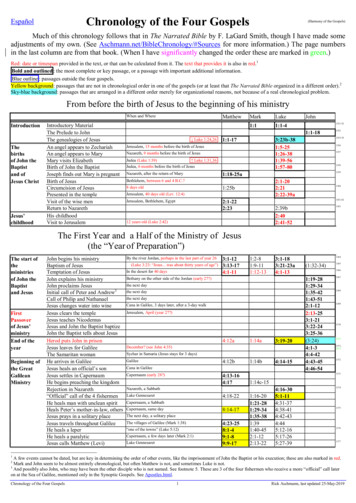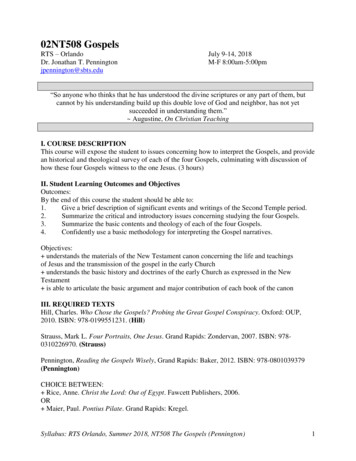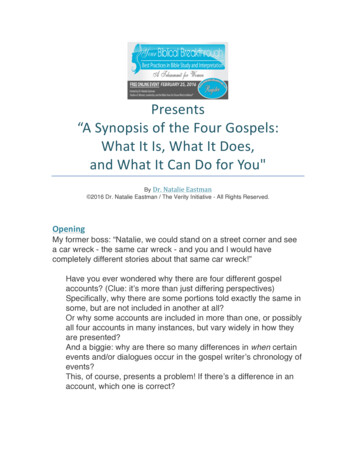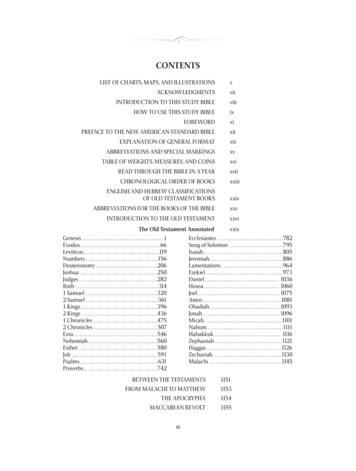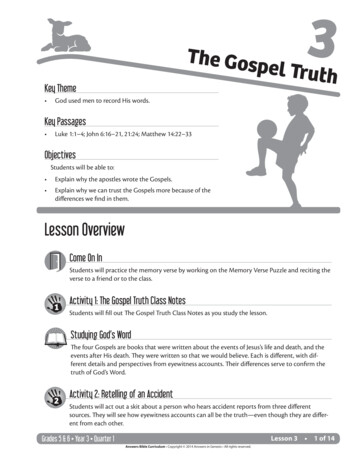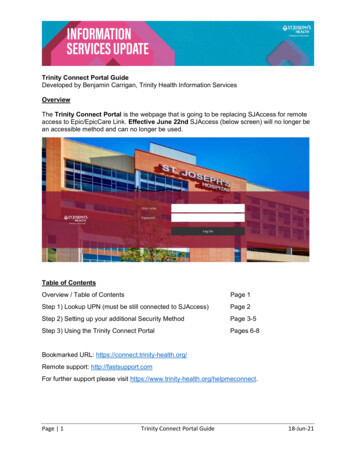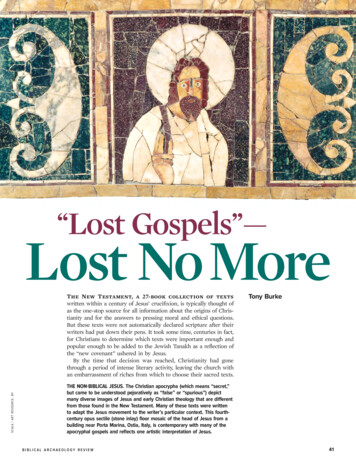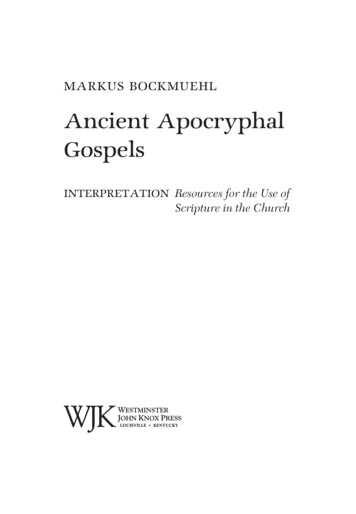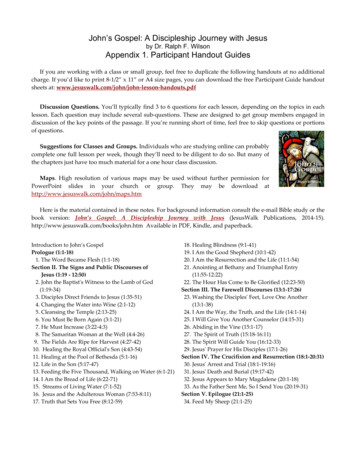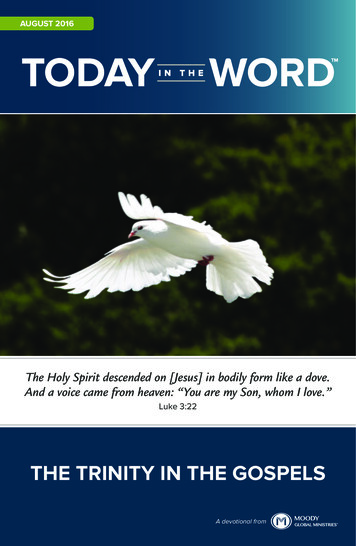
Transcription
AUGUST 2016The Holy Spirit descended on [Jesus] in bodily form like a dove.And a voice came from heaven: “You are my Son, whom I love.”Luke 3:22THE TRINITY IN THE GOSPELSA devotional from
TODAY WITH DR. PAUL NYQUISTPresident of Moody Global MinistriesGrasping the InfiniteIs it possible for ahuman being tounderstand God, tograsp the infinite? Juststep outside on a darknight and gaze up atthe stars. We can seeonly about 5,000 stars, but scientistsestimate as many as a septillion starsexist in the visible universe, that’s1,000,000,000,000,000,000,000,000.That’s infinitely more than our minds canpossibly comprehend.In the same way, perfect, completeknowledge of God surpasses our abilityto understand fully. Yet, grapplingwith the concept of His character asdisplayed in the Trinity is essential forthe believer today.Belief in the Trinity, the co-existentrelationship of the three persons of God,distinguishes Christianity from otherreligions. Followers of Islam sharplycriticize it, saying the Trinity denies theoneness of God. They ask, “How canOne God be three distinct persons?” It isa worthy question, and I have yet to finda satisfactory illustration for the Trinity(such as the egg or ice). For me, they allfail to completely capture the unity thatexists within the Godhead.And, if you search for it, you will notfind the word Trinity in Scripture. The(800) 356-6639early church created this term to helpus articulate the relationship betweenthe Father, the Son, and the Holy Spirit.Yes, putting the mysteries of the Trinityinto mere human words is like trying tohold the stars in our hands. But we learnimportant things, and we can know moreabout God by studying His three persons.In the description of creation, weare introduced to the plurality ofGod’s character, “Let us make manin Our image” (Gen. 1:26). The wordtranslated here as “us,” Elohim, is plural.Throughout Scripture, we see all threemembers of the Trinity. In the accountof Jesus’ baptism in the Gospels, allare present as Jesus is immersed inthe water, the Spirit of God descendsas a dove, and the voice of the Fatherspeaks (see Matt. 3:16, 17).Understanding the Trinity also helps usbetter understand who God created usto be. In Genesis 2:18, God said, “It isnot good for the man to be alone.” HereGod reflects His character in us. We aremade in God’s image, created to live inrelationship. The three persons of Godoffer us a model of community, purpose,and love.As John Calvin put it, “Without knowledge of God there is no knowledge ofself.” The three persons of the Trinityreflect God’s desire for us. n
THEOLOGY MATTERSby Dr. John KoesslerShadows of the TrinityThe threefold nature of the oneGod is certainly revealed in theNew Testament, and we haveglimpses that foreshadow this truth inthe Old Testament. One of the first hintsof the Trinity comes from the plural formof the name of the God in the creationaccount in Genesis 1:3. This does notprove the doctrine of the Trinity, but itdoes provide our first glimmer of thisaspect of God’s being.Another indication of the Trinitariannature of God can be seen in the waythat God’s Spirit works throughout theOld Testament. The Holy Spirit doeswhat only God can do. He is the agentof creation in Genesis (Gen. 1:2). Heis both omniscient and omnipresent(Ps. 139:2–10). He is also the onewho speaks through the prophets(Zech. 7:12).The Old Testament also speaks of themysterious figure called the Angel ofJehovah (Gen. 16:7–13). This being isdistinguished from Jehovah, yet has thesame power and is accorded the samereverence as Jehovah. Those whosaw the Angel of Jehovah testified thatthey had seen God (Gen. 32:30; Hosea12:3–4). The Angel of Jehovah—whomthe New Testament reveals as Jesus—can forgive sin or refuse to forgive it(Ex. 23:20–21).The Bible’s doctrine of the Trinity isrevealed progressively. What is onlyimplicit in the Old Testament is explicitin the New Testament, where divinity isascribed to Father, Son, and Holy Spirit.The Old Testament does not reveal thedoctrine of the Trinity through abstractpropositions or theological statementsbut by action and ascription. The Father,Spirit, and Angel of Jehovah all do whatonly God can do. Each is treated withthe regard that belongs to God alone.The church began to use the term Trinityaround the second century. In subsequentcenturies, the church articulated moreprecise theology as it confrontedinadequate views about Jesus Christand the Holy Spirit and the relationshipbetween the three persons of the Trinity.The doctrine of the Trinity hasimplications for the church’s communallife. What the Bible reveals about theTrinity not only shows us what Godis like, it also shows us who we are.Through Christ we “are being builttogether to become a dwelling in whichGod lives by his Spirit” (Eph. 2:22). nFOR FURTHER STUDYTo learn more about the Trinity, readExperiencing the Trinity: The Graceof God for the People of God by JoeThorn (Crossway).TODAYINTHEWORD.COM
FROM THE EDITORSby Bruce EverhartWrong Address, Right ReaderGod is using the ministry of Today inthe Word to reach people, sometimesin unexpected ways! Sarah, one of ourDonor Resource Management teammembers, regularly receives calls frompeople who are moving and need tochange their address so that they cankeep receiving their copy of Today inthe Word. But sometimes the monthlydevotional continues to arrive at theiroriginal address for the next fewmonths while the postal service catchesup with the address change. The newresidents open their mailbox to find acopy of Today in the Word addressedto the previous occupant.Some of these people have thencontacted Sarah to ask if they can beadded to the mailing list. They want tocontinue receiving this devotional thatwas originally sent to them by “mistake.”As you and I know, with our God thereare no mistakes. This devotional thatwas intended for one person is nowministering to another. Isn’t it amazinghow God can work—even through thetangle of red tape—to work His will inour hearts and lives!It reminds me of a verse in Genesiswhere Joseph is reflecting on the twistsand turns of his life, particularly theevil actions of his brothers. He says,“You intended to harm me, but God(800) 356-6639intended it for good to accomplish whatis now being done, the saving of manylives” (Gen. 50:20). What a wonderfulGod we serve, a God who is perfect inevery way. What we may be temptedto view as a simple mistake might havebeen intended by God for good “toaccomplish what is now being done,the saving of many lives.”As you complete the study this month,will you join me in praying for thewide-reaching, life-changing ministryof Today in the Word? Please ask Godto continue to use it to strengthenreaders in their knowledge of His Word.Ask that God will extend the reach ofthis ministry and continue to use thisdevotional in unexpected ways. Wedesire to reach new readers who mayhave never experienced a personalrelationship with our Savior.Thank you for your financial supportof this ministry. We depend on thecontributions of every reader tounderwrite the considerable expensesof producing this devotional. As yougive to the ministry of Today in theWord, know that we consider youa partner in ministry, and you arehelping men and women grow in theknowledge and grace of God and HisWord that accomplishes His will intheir lives. n
VOLUME 29 ISSUE 8EXECUTIVE EDITORBruce EverhartCONTENT STRATEGYGeorgia JosephEDITORHelen MolineMANAGING EDITORHeather MoffittASSOCIATE EDITORElena MafterCONTRIBUTING EDITORSJamie JanoszJohn KoesslerWRITERDevotionals: Brad BaurainART DIRECTORLynn GabalecGRAPHIC DESIGNERSLarry Bohlin, Dana ChenBUSINESS MANAGERPaul B. CurrieMOODY GLOBAL MINISTRIESPRESIDENTJ. Paul NyquistPROVOSTJunias VenugopalEXECUTIVE VICE PRESIDENTSteven MogckSENIOR VICE PRESIDENTGreg R. ThorntonCHIEF FINANCIAL OFFICERKen HeulittVICE PRESIDENTSTim ArensLarry DavidhizarJim ElliottBruce EverhartChristine GorzJohn A. JelinekCollin G. LambertFrank W. Leber Jr.Paul SanthouseJames SpencerJanet StivenDebbie ZelinskiTRUSTEESChristopher DenisonOrbelina EguizabalT. Randall Fairfax (Chairman)Thomas S. FortsonManuel GutierrezJerry B. JenkinsPaul Johnson (Emeritus)James MeeksJ. Paul NyquistDavid SchipperJulianna SlatteryPaul Von TobelMark WagnerRichard E. WarrenRichard YookThe Trinity in the GospelsAndrei Rublev, the 15th-century Russian artist, leftus one of the most poignant representations of themystery of the Trinity: his painting The Trinity, alsocalled The Hospitality of Abraham. Currently in theTretyakov Gallery in Moscow, this jewel of Russianart shows the three angels who visited Abrahamin his tent. Art historians and Bible scholars agreethat these three angels reflect the triune God:“The Lord appeared to Abraham near the greattrees of Mamre” (Gen 18:1). Rublev’s masterpiecespeaks to us through the centuries with the image ofthe angels’ silent peaceful communion, mutual love,unity, and humility.The Gospel writers create a similar image. In our studythis month, their Spirit-inspired words will speak tous about the Trinity and worship, the Trinity and truth,the Trinity and God’s gifts, the Trinity and the powerof God, and more. And as we study various passagesin the Gospels, we pray the Lord would draw us intocommunion with the Great I AM, and to each otherthrough His Spirit—in love, unity, and humility.Thank you for studying the Bible with Today in theWord this month! May we welcome the Lord into ourhomes and our hearts, as Abraham did near the oaksof Mamre. And may we rejoice in the union we havewith God through Christ by His Spirit! nMoody Global Ministries is the sole publisher of Today in the Word, copyright 2016 by Moody Global Ministries. All rights reserved. Please direct all Todayin the Word inquiries to Donor Resource Management, 820 N. LaSalle Blvd.,Chicago, IL 60610. Scripture taken from the Holy Bible, New International Version ,NIV , copyright 1973, 1978, 1984, 2011 by Biblica, Inc. Used by permission.All rights reserved worldwide. Scripture taken from the New American StandardBible , copyright 1960, 1962, 1963, 1968, 1971, 1972, 1973, 1975, 1977, 1995 bythe Lockman Foundation. Used by permission. Printed in the U.S.A. Today in theWord is published monthly. Printed on 30% recycled paper.TODAYINTHEWORD.COM
READ LUKE 1:8–17MONDAYAUGUST1He will be filled with the Holy Spiriteven before he is born.Luke 1:15The Trinity and the Mission of John the BaptistThe doctrine of the Trinity, God asThree-in-One, is one of the most difficultin Christian theology. John Wesley said,“Bring me a worm that can comprehenda man, and then I will show you a manthat can comprehend the Triune God.”Though it is challenging, studying theTrinity can also be very rewarding.Augustine said, “There is no subjectwhere error is more dangerous, researchmore laborious, and discovery morefruitful than the oneness of the Trinity ofthe Father, the Son, and the Holy Spirit.”This month’s study approaches thisdoctrinal topic within the four Gospels(mostly) and the life of Christ. In thesefamiliar narratives, the Three-in-Oneoften interact or are spoken about asidentifiably different Persons. The goalof our study is to reach a richer andfuller understanding of God, includingHis love, His plan of salvation, and howthe Trinity works in the world and in thelives of believers.6Our readings will begin in chronologicalorder and then become organizedthematically. August 1 to 10 will focus onthe Trinity’s involvement in Christ’s birth.From August 11 to 20, the passagesdeal generally with the interaction andwork of the Trinity. From August 21 to31, the emphasis is on the Trinity’s roleswith regard to redemption and theproclamation of the gospel.In today’s reading, the three Personsof the Godhead are all involved.Zechariah offered incense in the templeto worship the Father (vv. 8–10), whosent an angel to him with an importantmessage (v. 19). He and his wife wouldhave a son who would prepare the wayfor the Messiah, the Son of God (vv.16–17). This prophet, John, would befilled with the Holy Spirit throughouthis life, beginning even before his birth(vv. 15, 41–45).APPLY THE WORDPRAY WITH USThis month’s study provides an opportunity todiscuss the Trinity with your pastor or other churchleaders. What does your congregation’s doctrinalstatement affirm about the Trinity? What biblicaltexts do they see as key in understanding it? Yoursmall group Bible study or Sunday school classcould also address this topic.Today starts the EmployeeAppreciation Week at Moody.Dr. Paul Nyquist, Moody’spresident, asks you to join us bypraying for all employees—thosewho work behind the scenes,those at the forefront of publicministry, and those in leadership.TODAY IN THE WORD
READ LUKE 1:26–38The Holy Spirit will come on you, and the power ofthe Most High will overshadow you.Luke 1:35TUESDAYAUGUST2The Trinity and the Virgin BirthThe Creation account in Genesisconnects God the Holy Spirit with thegeneration of life. In the beginning,before God spoke, when “the earthwas formless and empty . . . the Spirit ofGod was hovering over the waters” (1:2).When God created the first man, Adam,He “breathed into his nostrils the breathof life” (2:7). In Hebrew, the same word istranslated as both “breath” and “spirit,”indicating God’s ability to create adistinctive kind of life made in His image.In today’s reading, we see that the HolySpirit is the One who generated life inthe womb of the virgin Mary (v. 35). OnlyGod can do the impossible and bringlife from nonlife. Just as He breathedhuman life into the dust of the ground,so also He conceived life in a virgin’swomb. God is the One who ultimatelyholds all power over life and death.God the Father planned it all. Hispromises never fail (vv. 36–37)—oneof David’s descendants would be aneternal King (vv. 32–33). He sent anangel with a message to Mary; sheresponded differently from Zechariah,submitted obediently, and countedherself a recipient of God’s favor andblessing (vv. 28, 30, 38).The baby to be born was, of course,Jesus, the Son of God (vv. 31–32)—theMessiah and the second Person of theTrinity. He is God Incarnate. Throughthe Son, the Father would fulfill Hiscovenant with David. Christ—the Greektitle that means “Messiah”—will reignforever and ever (see Rev. 11:15)!By focusing on the Three-in-One in thisepisode, we gain a greater appreciationfor God’s faithfulness, love, power,promises, plan of redemption, andsovereignty over life, as well as of theawe-inspiring mystery of the Incarnationof Jesus.APPLY THE WORDPRAY WITH USHow can the first Person of the Trinity send thethird to conceive the second as a human baby?Paradoxes like this are a mode of being beyondour understanding. Rather than be distracted bythe mysteriousness of the Three-in-One, ask whatGod wants you to learn about Himself this month.Make this a topic for prayer today.As Employee Appreciation Weekcontinues on Moody’s Chicagocampus, we’d like to mention inprayer the staff of the HumanResources department headed byvice president Debbie Zelinski. Weare grateful for all the effort theyput into this event.MOODY GLOBAL MINISTRIES7
READ MATTHEW 1:18–25WEDNESDAYAUGUST3She will give birth to a son, and you are togive him the name Jesus.Matthew 1:21The Trinity and Joseph’s FaithWhat does it mean to say that God isa Trinity? One source offers a concisedefinition of this important doctrine:“The one God exists in three Personsand one substance, Father, Son,and Holy Spirit. God is one, yet selfdifferentiated; the God who revealsHimself to mankind is one God equallyin three distinct modes of existence, yetremains one through all eternity.”The Trinity is at the heart of theChristmas story. Just as all threePersons played distinctive roles in thelives of Zechariah and Mary, so also allthree are present in the story of God’sintervention with Joseph. Interventionwas needed because Joseph, as onemight expect, just couldn’t believe hisfiancée’s story of a virgin conception.The Father once again sent an angel,this time in a dream, to tell Joseph itwas true. Joseph responded in faith,which was consistent with his character.8He was, after all, faithful to the Law anda true worshiper of God. He receivedthe angel’s message as authoritativebecause He knew that God had both theright and the power to do the impossible.The angel also told Joseph that thebaby in Mary’s womb was the Messiah,come to save people from sin (v. 21).More than that, He was Immanuel,“God with us,” the second Person of theTrinity (v. 23). God’s presence with Hispeople always signifies His covenantfaithfulness and love.Mary’s pregnancy was the work of theHoly Spirit (v. 18). Since God is the great,self-existent I AM, it could not have beenotherwise. This also fulfilled Isaiah’sprophecy of a virgin birth (Isa. 7:14),which was authorized by the Father andinspired by the Spirit (v. 22). The entireTrinity participated in the birth of Christ—acting as separate Persons, but one inessence and purpose.APPLY THE WORDPRAY WITH USMany good theological sources are availableto learn more about the Trinity. In addition tothe recommendation in this month’s “TheologyMatters” column, another brief article that coversbasic biblical truths in a clear, concise manneris “What is the doctrine of the Trinity?” by MattPerman, found on the Desiring God website.Your prayer support is importantfor the staff of our Event andGuest Services—BenjaminJacobson, Anna Gonzalez,Amanda Privett, Hannah Morley,and Kevin Utecht—as they workon the logistics of every eventhosted by Moody in Chicago.TODAY IN THE WORD
READ LUKE 1:67–79Praise be to the Lord, the God of Israel, because hehas come to his people and redeemed them.Luke 1:68THURSDAYAUGUST4The Trinity and Zechariah’s ProphecyThe classic hymn, “All Creatures of OurGod and King,” climaxes with praiseto the Trinity: “All creatures of our Godand King, / Lift up your voice and withus sing Alleluia! / . . . Let all things theirCreator bless, / And worship Him inhumbleness. / O praise Him! Alleluia!/ Praise, praise the Father, Praise theSon, / And praise the Spirit, Three inOne! / O praise Him! Alleluia!”The Trinity is highlighted in Zechariah’sprophecy at the birth of his son, Johnthe Baptist. After confirming the nameJohn, Zechariah’s ability to speak (takenaway by God as a result of his doubtfilled response in the temple), wasrestored to him. Filled by the Holy Spirit,he used his newly regained speech topraise God and to deliver an incredibleprophecy (v. 67).Most of Zechariah’s prophecy was notabout his own son but rather about theson of Mary—the Son of God. Jesuswas God’s “horn of salvation” (v. 69),the literal embodiment of His longpromised plan of redemption. He wasthe “rising sun” dawning with God’slight for “those living in darkness andin the shadow of death” (vv. 78–79). Hewould guide sinners’ feet into the “pathof peace” with God (see Rom. 5:10).Zechariah’s son, John, would be Hisforerunner, preparing the way with a callto repentance and forgiveness.All of this was taking place accordingto the plan of God the Father. Theseevents signified that “he has cometo his people and redeemed them”(v. 68). In Christ, the Father fulfilledHis covenants with David and withAbraham, as well as many prophecies.His “tender mercy” was the impetusfor salvation (v. 78). Throughout hisprophecy, Zechariah emphasized God’sstrength, faithfulness, and especiallyHis love.APPLY THE WORDPRAY WITH USZechariah rejoiced because now God’s peoplewould be enabled “to serve him without fearin holiness and righteousness” (vv. 74–75). Wecan now serve and obey the Lord as we ought.Thanks to Jesus’ death and resurrection and theindwelling of the Holy Spirit, we can bring glory toGod and devote our lives to serving and loving Him.Today we continue in prayer forEvent and Guest Services and askthat you add Nathanial Jacobs,Samuel Ju, Sonya Valeff, StaceyCraelius, and Teresa Mast toyour list. We thank God for theircontribution to the success ofMoody’s conferences.MOODY GLOBAL MINISTRIES9
READ LUKE 2:22–32FRIDAYAUGUST5He was waiting for the consolation of Israel,and the Holy Spirit was on him.Luke 2:25The Trinity and the End of WaitingMany have tried to understand theTrinity through analogy. Perhapsthe Trinity is like a person’s roles orrelationships, as when one person issimultaneously a father, son, and friend.Perhaps it is like water, which can existas gas, liquid, or solid. Or perhaps itis like an egg, which is one thing yetconsists of a shell, yolk, and egg white.These analogies are sometimesheretical and always inadequate. Theycannot truly explain how God can bethree Persons and yet one God. Thisdivine mystery demands our faith evenas we continue to seek understanding.That’s how Simeon lived his life, and hewas richly rewarded in today’s reading.Simeon had waited all his life for thecoming of the Messiah, and God grantedhim the privilege of seeing Jesus inperson before he died. The Holy Spiritwas with Simeon and had revealed thatthis would be so. On that day, the Spiritled him to a specific young couple in thetemple courts (vv. 25–28).Simeon took the incarnate Son of Godin his arms and rejoiced! The Messiahhad come; the time of waiting wasended! Jesus was God’s salvation for“all nations: a light for revelation to theGentiles, and the glory of your peopleIsrael” (vv. 29–32). Responding to Him,whether in acceptance or in rejection,would determine people’s eternaldestinies and relationship with God.Mary and Joseph had come to thetemple because God the Father hadmandated that all firstborn sons bededicated to the Lord (v. 23). This was areminder of the nation’s liberation fromslavery in Egypt, the tenth plague, andthe life-saving blood on the doorposts(see Exodus 13). Now God the Sonfulfilled this symbolism—the first personto be perfectly consecrated to God andto live a perfectly holy life.APPLY THE WORDPRAY WITH USSimeon’s meeting with Mary and Joseph (and thatof Anna in verses 36 to 38) in the temple courts isan example of a “divine appointment.” Mary andJoseph were surely surprised, but they respondedwith humble attentiveness and faith, just as weshould when God brings people across our paths.Are we ready for our next divine appointment?Every ministry of Moody issupported by the hard workof the men and women in theOperations division headed byexecutive VP and chief operatingofficer, Steven Mogck. Please prayfor good teamwork, collaboration,and God’s guidance for this team.10 TODAY IN THE WORD
READ MATTHEW 3:13–17SATURDAYThis is my Son, whom I love;with him I am well pleased.AUGUSTMatthew 3:176The Trinity and the Baptism of JesusWe believe, wrote fourth-centurytheologian Athanasius, “in one God,Father Almighty, Maker of all things visibleand invisible; and in one Lord, JesusChrist, his only-begotten Son, and in oneHoly Spirit; one God, known in the holyand perfect Trinity, baptized into which,and in it united to deity, we believe thatwe have also inherited the kingdom.”At the baptism of Jesus, all threePersons of the Trinity were distinctlyand powerfully present. Jesus, the Son,came to be baptized by John. Thisrepresented the climax of the Baptist’sministry, though he hesitated (v. 14).After all, a sinless man did not needbaptism to signify repentance from sin.Jesus, however, asked to be baptizedto signify His consecration to the will ofHis Father and the launch of His publicministry (v. 15).John, as we know, was filled with theHoly Spirit even before his birth (seeLuke 1:15). It’s reasonable to infer thathe knew his cousin’s true identity asthe Messiah and Son of God througha revelation from the Spirit. WhenJohn baptized Jesus, the Holy Spiritdescended “like a dove” (v. 16), a formsymbolizing purity and innocence.In addition, the voice of God theFather spoke from heaven: “This ismy Son, whom I love; with him I amwell pleased” (v. 17). Love is part of theinner life of the Trinity. Since love musthave an object, from eternity there musthave been Someone for God to love. Inthis sense, God being more than onePerson was perhaps inevitable, thoughstill mysterious.On this occasion, alluding to Psalm 2:7and Isaiah 42:1, God publicly identified,affirmed, and encouraged His Son asHe began His mission of redemption(see 1 John 4:8–9).APPLY THE WORDPRAY WITH USBefore His ascension, Jesus instructed us to makeand baptize disciples in the name of the Trinity(see Matt. 28:19). For the church, baptism signifiesdiscipleship, a public commitment to following andobeying Christ. Baptism reminds us that we identifywith the death and resurrection of our Lord and, likeHim, are consecrated to doing the will of our Father.Today and tomorrow, please keepin prayer Moody’s AcademicRecords department. Thank Godfor the faithful service that AuctaviaCegers, Bethanne Tremper, DavidThompson, and Elise Champanhetprovide to our students.MOODY GLOBAL MINISTRIES 11
READ MATTHEW 4:1–11SUNDAYAUGUST7Jesus was led by the Spirit into the wilderness to betempted by the devil.Matthew 4:1The Trinity and the Temptation of JesusDuring Jesus’ temptation in thewilderness, both He and Satan quotedScripture. What made the difference?Hermeneutics, a term meaning“interpretation.” Satan misrepresentedScripture’s meaning and tried to twist itto his own ends, while Jesus accuratelyand faithfully interpreted Scripture,remaining righteous and obedient. Withthe help of good biblical hermeneutics,He chose truth over falsehood andobedience over sin.We might wonder why the Spirit ledthe Son into the wilderness for thisimportant episode. Facing off againstSatan was the other half of thelaunch of Jesus’ public ministry, thecomplement to the Father and Spirit’saffirmation at His baptism. This was nota one-time test, as the spiritual battlewould continue throughout Jesus’life (see Luke 4:13). Satan completelyopposed Jesus’ mission of redemption,just as today he wars against God’swork of salvation in our own lives (see1 Peter 5:8).We should be encouraged that Jesusfaced temptation, just as we do (seeHeb. 4:15). It’s particularly encouragingthat He was led into this situation bythe Holy Spirit, which meant it was notoutside the will of God. We, too, shouldbe led by the Spirit (Rom. 8:14). Evenwhen confronting direct temptation bySatan and His own physical hunger,Jesus did not give in. He was insteadfilled with the Holy Spirit—again, just aswe should be—and perfectly resistedSatan’s deceit.Tellingly, God the Father is referencedin each of the three Scriptures quotedby Jesus. The Son trusted His Father’swords (v. 4). He would never attempt tomanipulate Him or force His hand (v. 7).God alone is worthy of worship (v. 10).To bend the knee to any other, for anyreason, would be faithless and sinful.APPLY THE WORDPRAY WITH USHow can we fight against temptation like Jesusdid? Like Him, we should know the Scriptures!Solid hermeneutics enables us to choose truth overfalsehood and obedience over sin. We should alsoremember our identity in Christ and what it means—we are now free to resist sin and to live worthy of thegospel to which we have been called (see Eph. 4:1–6).Will you include in prayer therest of the Academic Recordsstaff? George Mosher, JulianneVanPeursem, Troy Dueck, andTyrome Turner are grateful foryour prayer support as they followand document our students’progress throughout their studies.12 TODAY IN THE WORD
READ JOHN 3:22–36The Father loves the Son and has placed everythingin his hands.John 3:35MONDAYAUGUST8The Trinity and the Testimony of John the BaptistElection season is full of self-promotion.Candidates running for politicaloffice trumpet their positions andqualifications in order to persuadevoters to support them. Theircampaigns often also attack their rivals,both directly and indirectly. Humanlyspeaking, such strategies are in factnormal. People often seek competitiveadvantage at the expense of others.John the Baptist’s actions in today’spassage run counter to this typicalhuman behavior. Jesus had begun Hispublic ministry and gathered somedisciples. What did John think aboutthat? He reminded his listeners thathe had always said a greater One wascoming (v. 28). In his metaphor, God’skingdom is a wedding, he is the bestman, and Christ is the bridegroom (v.29). The bottom line: “He must becomegreater; I must become less” (v. 30).Jesus was the Son of God. He had comefrom heaven and had spoken with divineauthority the very words of God. TheFather loved Him and had delegatedall authority to Him. Belief in Him is thegateway to eternal life. Significantly, theFather had given Jesus “the Spirit withoutlimit” (v. 34). This reflects the essentialunity of the Godhead—all three Personsare of one mind, equal in attributes, andspeak and act as God (vv. 31–36).John knew that his ministry mandatecame from the Father, but unlike theministry of the Son, his work was limitedin scope and duration. To believe inthe Father is to believe in the Son. TheFather loved the Son, sent Him with theSpirit, and gave Him all authority. Hiswrath awaits whoever does not believethis, because not believing it is thesame as calling God a liar (vv. 33, 36).God’s wrath is aimed at sin and evil—Hesent His Son to provide another way.APPLY THE WORDPRAY WITH USDo you believe in Jesus? Have you trusted in theSon for salvation? Have you rejoiced in the Father’splan of redemption and been sealed in the Spirit(see Eph. 1:13–14)? The three Persons of the Trinityloved you enough to make a way for you to escapeGod’s wrath and spend eternity with Him. Will youaccept this invitation and trust in Him today?Today, we would like to give ourprayer support to the ministry ofDr. Junias Venugopal, provostand dean of Education. We askfor God’s guidance and refreshingpower in his leadership role oftraining future Christian leadersfor global ministry.MOODY GLOBAL MINISTRIES 13
READ LUKE 4:14–21TUESDAYAUGUST9He has sent me to proclaim freedom for theprisoners and recovery of sight for the blind, to setthe oppressed free.Luke 4:18The Trinity and the Fulfillment of P
the New Testament reveals as Jesus— can forgive sin or refuse to forgive it (Ex. 23:20–21). The Bible’s doctrine of the Trinity is revealed progressively. What is only implicit in the Old Testament is explicit in the New Testament, where divinity is ascribed to Father, Son, and Holy Spiri

